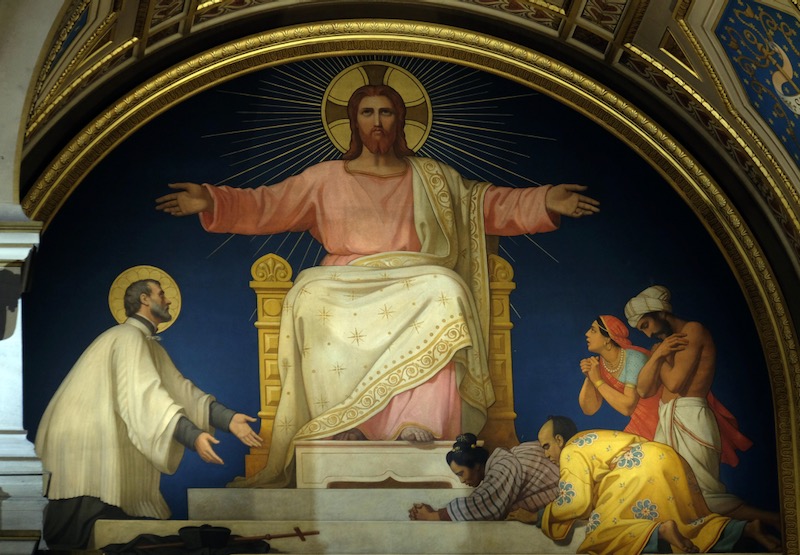Today, December 3, the Church celebrates the Memorial of Saint Francis Xavier.
Ever since I was in grade school, I considered Francis Xavier to be one of my favourite saints, especially since my family is from India. Before entering the Jesuits, I visited his church in Goa in the summer of 2009, and had an exclusive viewing of his relics.
During the 30-day Spiritual Exercises retreat while I was a Jesuit novice, I read The Letters and Instructions of Francis Xavier. At that time, I recall the saint stating that Indians made for poor vocations due to their lack of commitment both to the order and to celibacy. I took the saint’s words at face value. After all, how could a saint be wrong?
But internalising these words led me to believe that there was something intrinsic in me as an Indian that deemed me incapable and unfit to serve as a priest. Because this was difficult to sit with, I then interpreted that I was different than the Indians Xavier was referring to since I was Westernised, having been born and raised in the US, and had a lineage that included the early Jewish Christians. I was not like the Hindu converts or the impoverished fishing villagers that Xavier made such comments towards.
As I now sit with Xavier’s words and my prior reactions to them, I realise that both the saint was wrong in his harmful, negative view of the Indian people, and that I was wrong in internalising this negative view and applying that to my fellow Indians.
It takes a special grace from the Spirit not to fall under the spell of a legend or hero, and honestly to name where a saint had strayed and where we are called not to imitate this example.
Further in Xavier’s writings, he often referred to the Indians in negative terms and viewed the people he was missioned to serve with disdain, likely influenced by the Portuguese colonists. Xavier’s reference to the colour of the Goan skin was not only “cringe” in modern day parlance, but truly shameful:
(Indians) being black themselves, consider their own colour the best, they believe that their gods are black….the great majority of their idols are as black as black can be…and seem to be as dirty as they are ugly and horrible to look at.
Even more deplorable, Francis Xavier himself asked for the Court of Inquisition in Goa. The Goan inquisition, described by Marathi historian and activist AK Priolkar as a “terrible tribunal” of torture, resulted in the brutalisation and deaths of countless native Goans. One source coined the Goan inquisition as a “holocaust,” particularly since there were Jews in Goa who had escaped the Inquisition in Europe only to become persecuted in this new land.
The Inquisition rendered the practice of Hinduism and Islam, along with the use of the local language Konkani, as punishable by death. The Portuguese colonists even seized Hindu children from their families. Additionally, the colonists burned villages, raped and seized women as slaves, and tortured native Goans by public flogging, burning them at the stake, and tying the Goans to large torture wheels.
Death and defilement were committed ostensibly in the name of Christ, yet Xavier and the Portuguese colonists crucified the Imago Dei of the Goan people.
As a man of the Exercises, I would have hoped that Xavier would have regarded the Indians as Christ would, particularly given the Jesuit call to find God in all things. Xavier fell short in recognising the Imago Dei in the Indian people. Additionally, he fell short of the words of his order’s founder, Ignatius of Loyola, who instructed Jesuits sent on mission to “look upon” those the missionary has been entrusted with “as someone bathed in the blood of Christ, an image of God, a temple of the Holy Spirit”.
Despite the saint’s harmful words and actions, the people of Goa celebrate Francis Xavier as their hero. There appears to be cognitive dissonance at work. I believe non-white people are often deluded into venerating whiteness and disowning their own God-given skin. While many became baptised at the famous arm of Xavier, the saint missed the opportunity of experiencing his own deepening conversion by recognising the presence of God in the Indian people.
How do we come to terms with a saint whose romanticised legend is far from reality?
Firstly, we must not try to explain away Xavier’s negative statements and actions, but acknowledge them in truth. Francis Xavier might have been canonised a saint, but on Earth he was a sinner like all of us, carrying biases and having propensities to certain sins. We can recognise that if God could do great works with such a sinfully oriented person, then God can also use us to do great things. A deep and honest dive into the history of any holy person would reveal there were areas they were in great error.
Dr Dawn Eden Goldstein recently acknowledged that GK Chesterton, who had been instrumental in her conversion, expressed an alarming level of anti-Semitism in his writings.
Although there is much that is good and true in Chesterton’s work, we cannot ignore that much of his writing expressed troubling and anti-Semitic ideas. We must engage in frank discussion about his offensive views. We must distinguish between those things he said that are worthy of praise and those things he said that are unacceptable. We must call out sin for what it is, even when it means acknowledging a difficult truth.
I believe we can apply the same praxis to Francis Xavier.
Secondly, we must confront the temptation to cancel Francis Xavier. I admit, I no longer consider Xavier to be the hero that I used to. But should we take his name off of churches and institutions, and take down his statues?
If an institution bears this saint’s name, it should be willing to acknowledge Xavier’s harmful treatment of the Indian people he had been sent to minister to, as well as the destructive inquisition on Indian soil that he initiated. Upholding a fictitious, laudatory narrative would make a false idol out of Xavier, who ordered the destruction of all idols in Goa. We too must destroy the false idols that we and our Church cling to.
Thirdly, what would Francis Xavier want us to do with his lesser-known, un-saintly history?
All saints seek to point us to Christ. Xavier would be no different. He would encourage us not to imitate his wrongful actions, and he would intercede for us that we in the present would better reflect love for people of different races and honor their God-given dignity. Additionally, he would encourage us to dispel of the inherent and unconscious biases that prevent us from seeing people who look differently than us as Christ sees them.
Therefore, let us learn from Francis Xavier that we are all in need of deeper conversion so that we can see and love the Imago Dei in all people. May we desire to accept all people who are different than us, respect their uniqueness, and learn their cultural practices. May we also learn to see the Body of Christ with a skin tone and language that is different than ours. Lastly, let us name and repent of any unconscious biases towards any particular ethnicity, and accept and love Christ present in people of all races.



 Loading ...
Loading ...
What do you think?
You can post as a subscriber user ...
User comments (0)